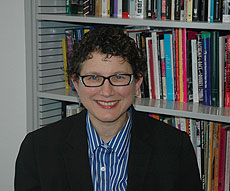At a time when documentary films are reaching larger audiences than ever, filmmakers working internationally face unprecedented threats, according to film scholar B. Ruby Rich, who will moderate a panel discussion about the emerging crisis during the Sundance Film Festival.
"There is a crisis in free speech that's affecting filmmakers," said Rich, a professor and chair of the Community Studies Department and Social Documentation Program at the University of California, Santa Cruz. "Filmmakers are attracting new enemies precisely because of the power of documentary. I want to put this on people's radar, because it is a major threat facing anyone doing documentary work."
In her 21st year at Sundance, Rich will chair the panel discussion, "Truth and Consequences," on Wednesday, January 21, from 1:30 to 4 p.m. at the Filmmaker Lodge in Park City, Utah. She will be joined by Academy Award-nominated filmmaker Hubert Sauper, who has been the target of a government-run hate campaign since his documentary Darwin's Nightmare exposed an environmental and humanitarian catastrophe in Tanzania.
"Hubert Sauper made a very highly acclaimed film, and since the Oscar nomination, the Tanzanian government began to take notice of him," explained Rich. "He has been the subject of a hate campaign by the Tanzanian government and its proxies. He has been the subject of lawsuits; he has been banned from the country; there have been calls for his death; and the people who appeared in his film have been persecuted."
Sauper's experience is not isolated, noted Rich: Other filmmakers have been the targets of similar campaigns that included harassment, threats, and worse. Joining Rich and Sauper on the panel will be filmmaker Ngawang Choephel, who is premiering his film Tibet in Song during the festival. Choephel was a political prisoner, held by the Chinese in Tibetan prisons for eight years as a consequence of recording traditional Tibetan songs for his documentary. Also joining them is Anders Ostergaard, director of Burma VJ, a documentary about the Buddhist rebellion. Made up of videos shot by the Democratic Voice of Burma, the footage was smuggled into Thailand, shipped to Norway, and subsequently broadcast around the world.
"What does it mean for countries to insist that they can control their own image, like corporations putting copyrights on intellectual property?" asked Rich. "It will mean outsiders or opposition figures inside cannot do any documentary work without government sanction. It will have a chilling effect on the free speech of filmmakers and on the free trade of information."
Nevertheless, filmmakers are challenging these restrictions, including two graduate students in the Social Documentation Program at UC Santa Cruz who have investigated women factory workers in China who have been poisoned by toxins on the job and the displacement of Afro-Colombians from their lands in Colombia.
"This is a new crisis that needs to be recognized," said Rich. "We want to put it before the attention of the world documentary community at Sundance." The panel discussion is being organized by Rich and Cara Mertes, director of the documentary film program at Sundance Institute.
In addition, Rich will moderate a panel discussion about film, gay rights, and the passage in November of Proposition 8 in California, which eliminated the right to marry for gay and lesbian couples in the state. Panelists will include John Cooper, director of festival programming for the Sundance Film Festival; Rob Epstein, Oscar-winning director of The Times of Harvey Milk and Celluloid Closet; Rashad Robinson, senior director of media programs for Gay & Lesbian Alliance Against Defamation; Matt Coles, director of LGBT & AIDS Projects for the ACLU; and Dayna Frank, cofounder of HOMOtracker & Freedom-Action-Inclusion-Rights. The panel, "LGBT Civil Rights, Film Activism & Prop. 8," takes place Sunday, January 18, at 2:30 p.m. in the Queer Lounge on Main Street in Park City.
Note to journalists: To arrange an interview with B. Ruby Rich, please contact Jennifer McNulty in the UCSC Public Information Office at (831) 459-4399 or jmcnulty@ucsc.edu.



